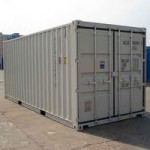 Temporary storage of construction materials, whether on-site or off-site is a little more involved than you may think.
Temporary storage of construction materials, whether on-site or off-site is a little more involved than you may think.
Whether you are involved in new construction, home renovation or remodel, at times it is necessary to purchase materials in advance of their scheduled installation to ensure your project continues to move forward.
What are stored construction materials and why might you be at risk when storing? These materials may be “long lead” items, for example, anything that would require measurements be taken, so it can be made to the exact size needed for your project.
Other long lead items can include heating, ventilating and air conditioning equipment or custom-made items like granite countertops, cabinets or windows.
When your contractor orders these materials to be stored off-site and requests payment for these materials you may be at risk if you don’t take steps to protect your investment.
When you don’t carry Builder’s Risk, you are AT RISK
 Special order materials, long lead items or custom materials can come from manufacturers who, through your contractor, have placed your order then in their production schedule.
Special order materials, long lead items or custom materials can come from manufacturers who, through your contractor, have placed your order then in their production schedule.
When your order is produced and unless that manufacturer can store your order until it is needed (usually at a cost), then it is shipped to your contractor’s place of business or warehouse (if they have the storage space to accommodate it) or it is shipped to another warehouse for storage until it is needed for installation.
Your contractor will bill you for this portion of their contract as a “stored material”. When you pay for stored materials off-site, you own it and are at risk if anything happens during that temporary storage before it is installed in your project. You become the responsible party should these materials get lost, damaged, stolen, or destroyed while stored and/or while in transit to the project.
Will you get what you paid for?
 If the warehouse it is stored in is not secure or licensed, and if the transportation from that place of storage to your project site is not covered by insurance, the risk exposure is yours.
If the warehouse it is stored in is not secure or licensed, and if the transportation from that place of storage to your project site is not covered by insurance, the risk exposure is yours.
As an example, imagine that you have a load of kitchen cabinets, where you’ve paid for the material in advance, and the truck transporting these cabinets in involved in an accident that damages or destroys those cabinets. That risk is yours because you own those cabinets.
This is particularly true of you do not have a Builder’s Risk insurance policy (or other insurance) covering your project where there can be provisions added for building materials, supplies, and equipment that are temporarily stored at locations away from your renovation or construction site.
Smart Storage of Construction Materials Tips

Listed below are some suggestions you may want to consider before paying for off-site stored materials. You, at a minimum, will want to discuss with your contractor the specifics of temporary storage of construction materials before they get to your project. This is often overlooked and unsuspecting owners are often left holding the bag.
- Your may want to have your contractor rent an on-site storage container (fairly inexpensive and if you have the room) to make sure your items are housed on-site and not off-site.
- Have your contractor include “transit coverage” in his policy for your project. This protects the insured’s property when transported over land from one place to another.
- Consider requiring off-site stored materials to be held in a secure facility within a manageable driving distance from your project so you can physically see that they are secured. Industry standard for stored materials payment is usually that they be within 50 miles of the project site.
- Have your contractor validate off-site stored facilities have security, are climate-controlled and have automatic sprinkler systems in the event of fire.
Warehouses under the Uniform Commercial Code have a responsibility to exercise a certain standard of care regarding storage but also have limited liability. Know what these limitations are.
Okay, so you’ve read this and are probably thinking that the likelihood of your temporary storage of construction materials being lost, stolen or damaged is pretty remote. Only you can determine if the potential risk to both your budget and your project schedule is worth a roll of the dice.
Tagged with: material transport • materials storage • storage of construction materials • storage of materials • temporary storage of construction materials
Filed under: Insurance





